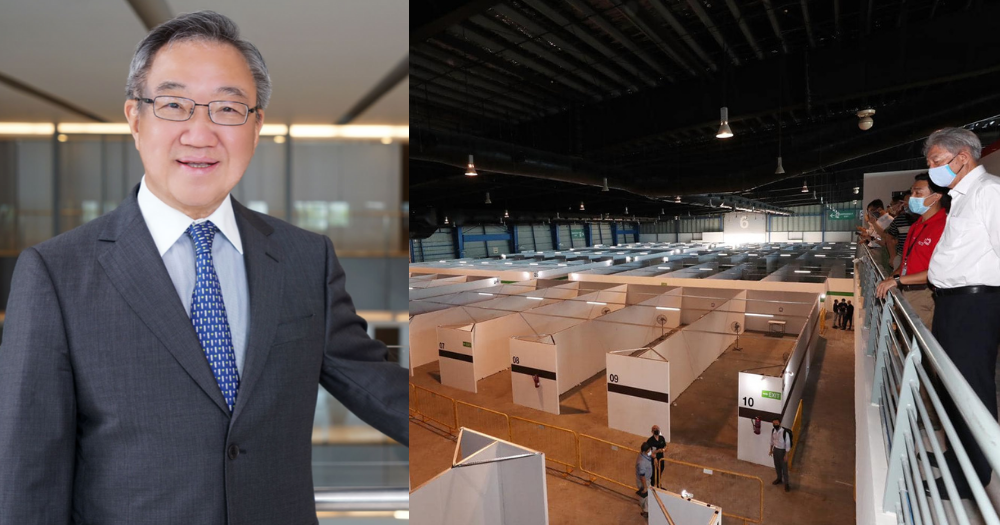It's easy to be lulled into a false sense of security by the mostly-zero daily new Covid-19 infections in the larger community these days, but roughly a year ago, the situation, if you recall, was vastly different.
And as the groundswell of infections spreading rapidly at Singapore's densely-packed foreign worker dormitories was just beginning to emerge, insiders in our healthcare sector who were informed of the unfolding crisis were gravely concerned.
One of these was Dr Loo Choon Yong, co-founder and executive chairman of Raffles Medical, Singapore's largest homegrown private healthcare group.
Invited to meet Senior Minister Teo Chee Hean
Speaking in a recent interview with Mothership, Loo revealed the pressure he felt when he was invited to a meeting with Senior Minister Teo Chee Hean in those months, as the government corralled its available resources and braced itself for a steep spike in Covid-19-positive patients here.
And it wasn't as if Raffles Medical was standing idly by up to this point — from as early as in January last year, they already had staff deployed on the ground at Changi Airport to conduct temperature checks on passengers arriving from Wuhan, and they also had healthcare staffers travelling to the foreign worker dormitories daily for swab tests.
But at that meeting, SM Teo also confidentially shared with Loo a significant amount of data and projections in terms of anticipated viral spread among Singapore's foreign worker population, which made it way harder for him to deliver his planned response of "No":
"So that's all the preliminary information. It hadn't gone to the rest of the world. We are close enough so we get information. I tell you I could even sense that when we realised dorms were so infected and the numbers... it's just scary.
You see, you look, all said and told we have 60,000 cases — that's what you call subclinical, that means they got it, nobody knows about it, no swabbing, nothing, right? And they have immunity, right? That's what i call subclinical. But if you think, just the foreign workers who stay in crammed dorms spread to each other, just 50 per cent of them. 350,000 (foreign workers in total, so you have) 175,000 cases. And if (there really are) 175,000 cases, all your hospitals will be overwhelmed."
Deployed nurses from overseas branches to Singapore
He remembers that when he saw this data at the meeting, he said it would be a "big headache for Singapore".
"...when I was asked to attend the meeting, and I saw this data, I say headache. Big headache for Singapore. What do you do? So they say all right, we think that the 35 years old and below seem to fare quite well. We don't need to put them in hospital anyway. We don't have the beds. So you're thinking 100,000 ah, wah. So they started mobilising many places — EXPO. And then Changi Exhibition Centre, every day they were admitting a few hundred cases."
And then the appeal for help came. Loo recalls being advised by his medical director to avoid promising any additional resources to the government to what had already been committed.
"So I said then, why are you asking me to go? Because Teo Chee Hean is very senior. You're our senior man, you gotta go. So I said I have to go be the chief apologist and say no.
So when I saw this data... it's very serious. Actually I did not commit, you know, I kept quiet. There was a lot of pressure on us."
So his answer to SM Teo? That it would not be easy for him to commit more help, until he thought of the idea of recalling his nurses working in his hospitals and clinics in China and Vietnam, where he felt the situation had improved.
"So I told the Senior Minister there I said, Okay, I can help you, but you must help me. I will bring back my foreign assets, foreign nurses, but you must clear them quickly. If you take six months to clear them, the war is over. I have no (other) resources... And to their credit, they relaxed and enabled us to bring back enough people... All in all, we brought back a few hundred nurses and we were able to take care of these people.
At that time, we didn't know how serious things were, but our job in these centres — these are called Community Isolation Facilities, community care centres, the whole idea is take care of them. And the moment they have a big problem, transfer them to hospital.
But by keeping them away from the dorm and other people you isolate them, quarantine them, you reduce the spread. And this was extremely helpful. At the beginning we were planning to expand our centre to accommodate 2,800 persons per day; they had planned to increase it to 4,000 by expanding the facility. In the end it was not needed. Even EXPO scaled back, because obviously we'd gotten over the peak and then it became less and less."
Read our full interview with Loo and his co-founder Dr Alfred Loh here.
Top photo by Raffles Medical Group and Teo Chee Hean/Facebook
If you like what you read, follow us on Facebook, Instagram, Twitter and Telegram to get the latest updates.
